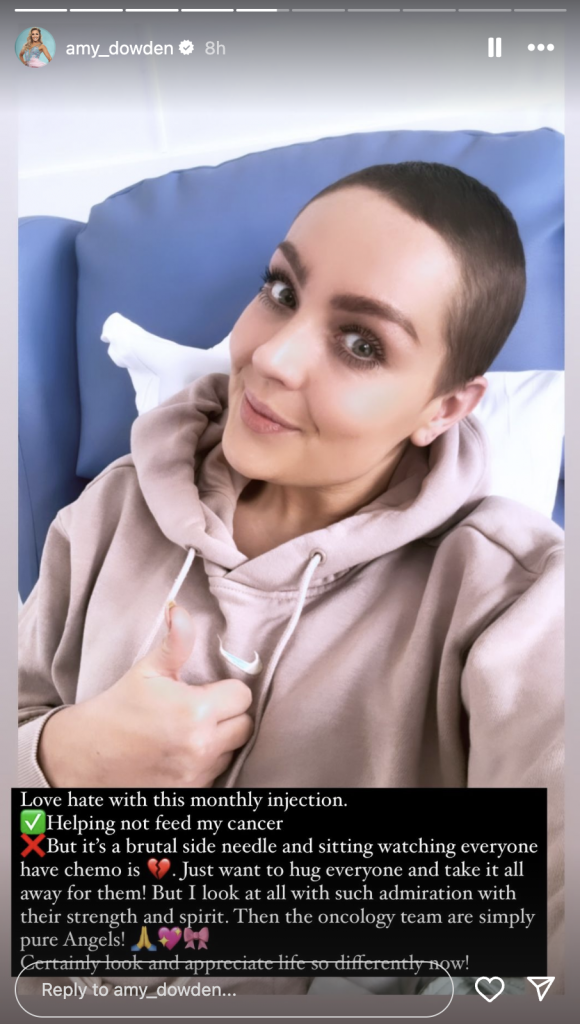Navigating Fertility After Cancer
- “Strictly Come Dancing” star Amy Dowden was diagnosed with stage 3 breast cancer. Along her journey, she’s undergone chemotherapy and a mastectomy. Last year, she had “no evidence of disease” after treatment. Today, she’s hopeful her treatment hasn’t negatively affected her ability to have children one day.
- A mastectomy is the removal of the entire breast during surgery. There are several factors to weigh when considering a mastectomy, such as whether breast-conserving surgery (or lumpectomy) is possible. Your doctor will evaluate the size and features of your tumor and your family history to make a recommendation.
- Chemotherapy can cause several side effects, including nausea, vomiting, and hair loss. Your doctor can help you manage some of these side effects. Fortunately for hair loss, while it usually begins about three to four weeks after starting chemotherapy and continues throughout treatment, it usually regrows after treatment concludes.
- Various cancer treatments, including chemotherapy and radiation, can affect both men’s and women’s fertility. IVF is among several options cancer patients can turn to if they have hopes of parenthood.
- Before undergoing cancer treatment, patients should speak to their doctors about fertility preservation if they wish to have a family in the future.
- Egg, sperm, and embryo freezing are common approaches to fertility preservation, but other options exist.
“It’s something that, you know, worries me,” Dowden told Edinburgh Live, reflecting on how cancer and its treatments might affect her ability to have children.


Fertility is often a concern for both women and men diagnosed with cancer.
Resources on Fertility and Cancer
- Fertility Preservation After a Cancer Diagnosis
- After A Cancer Diagnosis: Getting Fertility Hormone Injections
- How Does Chemotherapy Affect Fertility?
- Fertility Breakthrough! A Breast-Cancer Survivor Gives Birth After Her Harvested Eggs Mature in A Lab
- Pregnancy and Fertility After Thyroid Cancer: What Patients Need to Know
IVF’s Role In Family Planning For Cancer Patients
Fertility struggles are a genuine concern among cancer patients, as certain cancer treatments can cause infertility. Fortunately, in many cases, efforts can be made before beginning treatment to help preserve fertility.
Even without a diagnosis, many couples, at one point or another, experience infertility. The Centers for Disease Control and Prevention (CDC) says within the U.S., “about one in five” married women between the ages of 15 and 49 with no prior births are unable to get pregnant after trying for a year. Additionally, “one in four” of women in this group struggle to get pregnant or carry the pregnancy to term.
WATCH: How does chemotherapy affect fertility?
Infertility can be a side effect of cancer treatment due to how it impacts the body. Various cancer treatments, including chemotherapy and radiation, can affect both men’s and women’s fertility. Before undergoing cancer treatment, patients should speak to their doctors about fertility preservation if they wish to have a family in the future.
Patients should also recognize that infertility is a problem that affects so many people hoping to be parents, and nothing to be ashamed of.
The American Psychological Association said in its Monitor on Psychology Magazine, “A diagnosis of infertility — the inability to get pregnant after a year or more of trying — can lead to depression, anxiety, and other psychological problems, trigger feelings of shame and failure to live up to traditional gender expectations, and strain relationships.”
Among men, infertility can “cut into a man’s feelings of masculinity” and “can lead to issues of shame and embarrassment,” psychologist William D. Petok told the outlet.
Cancer’s Impact on Male Fertility
Cancer treatments like chemotherapy can damage sperm in men, and hormone therapy can decrease sperm production, according to the National Cancer Institute. Radiation treatment can also lead to lower sperm count and testosterone levels, impacting fertility.
Possible side effects of cancer treatment should be discussed with your doctor before starting treatment. Men may have the option to store their sperm in a sperm bank before treatment to preserve their fertility.
RELATED: Don’t Be Ashamed – The VA Has Treatment To Help Deal With Incontinence After Prostate Cancer Surgery
This sperm can then be used later as part of in vitro fertilization (IVF).
WATCH: Dr. Terri Woodard explains fertility preservation options patients have when going through cancer treatment.
Cancer Treatment’s Impact on Fertility in Women
Just as cancer treatment can impact men’s fertility, women may also be affected. Some types of chemotherapy can destroy eggs in your ovaries. This can make it impossible or difficult to get pregnant later. Whether or not chemotherapy makes you infertile depends on the type of drug and your age, since your egg supply decreases with age.
“The risk is greater the older you are,” reproductive endocrinologist Dr. Jaime Knopman told SurvivorNet.
“If you’re 39 and you get chemo that’s toxic to the ovaries, it’s most likely to make you menopausal. But, if you’re 29, your ovaries may recover because they have a higher baseline supply,” Dr. Knopman continued.
Radiation to the pelvis can also destroy eggs. It can damage the uterus, too.
Surgery to your ovaries or uterus can hurt fertility as well.
Meanwhile, endocrine or hormone therapy may block or suppress essential fertility hormones and may prevent a woman from getting pregnant. This infertility may be temporary or permanent, depending on the type and length of treatment.
If you are having a treatment that includes infertility as a possible side effect, your doctor won’t be able to tell you for sure whether you will be impacted. That’s why you should discuss your options for fertility preservation before starting treatment.
Research shows that women who have fertility preserved before breast cancer treatment are more than twice as likely to give birth after treatment than those who don’t take fertility-preserving measures.
Most women who preserve their fertility before cancer treatment do so by freezing their eggs or embryos.
After you finish your cancer treatment, a doctor who specializes in reproductive medicine can implant one or more embryos in your uterus or the uterus of a surrogate with the hope that it will result in pregnancy.
If you freeze eggs only before treatment, a fertility specialist can use sperm and your eggs to create embryos in vitro and transfer them to your uterus or a surrogate later on.
When freezing eggs or embryos is not an option, doctors may try these approaches:
- Ovarian tissue freezing is an experimental approach for girls who haven’t yet reached puberty and don’t have mature eggs or for women who must begin treatment right away and don’t have time to harvest eggs.
- Ovarian suppression prevents the eggs from maturing, so they cannot be damaged during treatment.
- Ovarian transposition, for women getting radiation to the pelvis, moves the ovaries out of the line of treatment.
In addition to preserving eggs or embryos, research has shown that women with early-stage hormone-receptor (HR) positive breast cancer were able to safely pause endocrine therapy (ET) to try to get pregnant, and they did not have worse short-term recurrence rates than people who did not stop endocrine treatment.
Dowden’s Cancer Journey
Amy Dowden’s breast cancer journey began this past April when she discovered the “first lump” just before she was set to go on a honeymoon with her husband.
“I was originally going to have a lumpectomy, radiotherapy, and hormone treatment,” Dowden said during a Coppafeel Instagram conversation.

A lumpectomy is a breast cancer treatment procedure that removes the cancerous area of the breast. Radiotherapy (radiation) involves using high-energy beams aimed at cancer cells, designed to kill them. Hormone treatment is used for hormone receptor-positive cancers, which are the most common types of breast cancer. When a tumor is “hormone receptor-positive,” it means that a pathologist has run special tests on the cancer to determine that it is positive for either the estrogen and/or progesterone receptor.
“For women who have hormone-positive breast cancer, it means that they have a cancer that needs estrogen to grow,” medical oncologist Dr. Elizabeth Comen explains to SurvivorNet.
“It needs hormones to grow. So, what we’re trying to do is actually starve the cancer cells or any rogue cancer cells that could have escaped the breast from estrogen. We do that by driving the estrogen levels down or by blocking the ability of estrogen to interact with the estrogen receptor on a cancer cell,” Dr. Comen continued.
“Then, after my MRI, they found another tumor, so then it changed into a mastectomy, and then, after my mastectomy, unfortunately, they found even more tumors,” Dowden added, leading to a stage 3 breast cancer diagnosis. During stage 3, the cancer has spread to nearby lymph nodes.
WATCH: What to consider before a mastectomy.
Dowden was told she needed to undergo chemotherapy to begin cancer treatment, which made her “scared,” but she bravely moved forward with treatment. Her oncologist reassured her, “With chemo [she’s] got a really good chance of a cure,” BBC reported.
Since she must focus on her health, Dowden is sitting out of this season’s “Strictly Dancing” series. Despite being unable to dance in person, she remains in contact with her team.
While undergoing chemotherapy treatment, Dowden entered the emotional stage of hair loss, which is a side effect of chemotherapy treatment. Luckily, with the height of her chemotherapy journey behind her, she can continue to improve as her journey towards remission continues.
What To Ask Your Doctor
If you have been diagnosed with breast cancer, you may have questions about keeping your strength through treatment. Here are a few questions to help you begin the conversation with your doctor:
- What treatment will I be receiving?
- What side effects are associated with this treatment?
- Are there steps I can take daily to help minimize these side effects?
- What physical activity routine do you recommend for me during treatment?
- Do you have recommendations for someone who doesn’t particularly enjoy exercise?
- Can you recommend a dietitian who can help me with healthy eating tips and weight maintenance?
- I’ve been having trouble sleeping. Do you have any treatment recommendations?
Learn more about SurvivorNet's rigorous medical review process.

